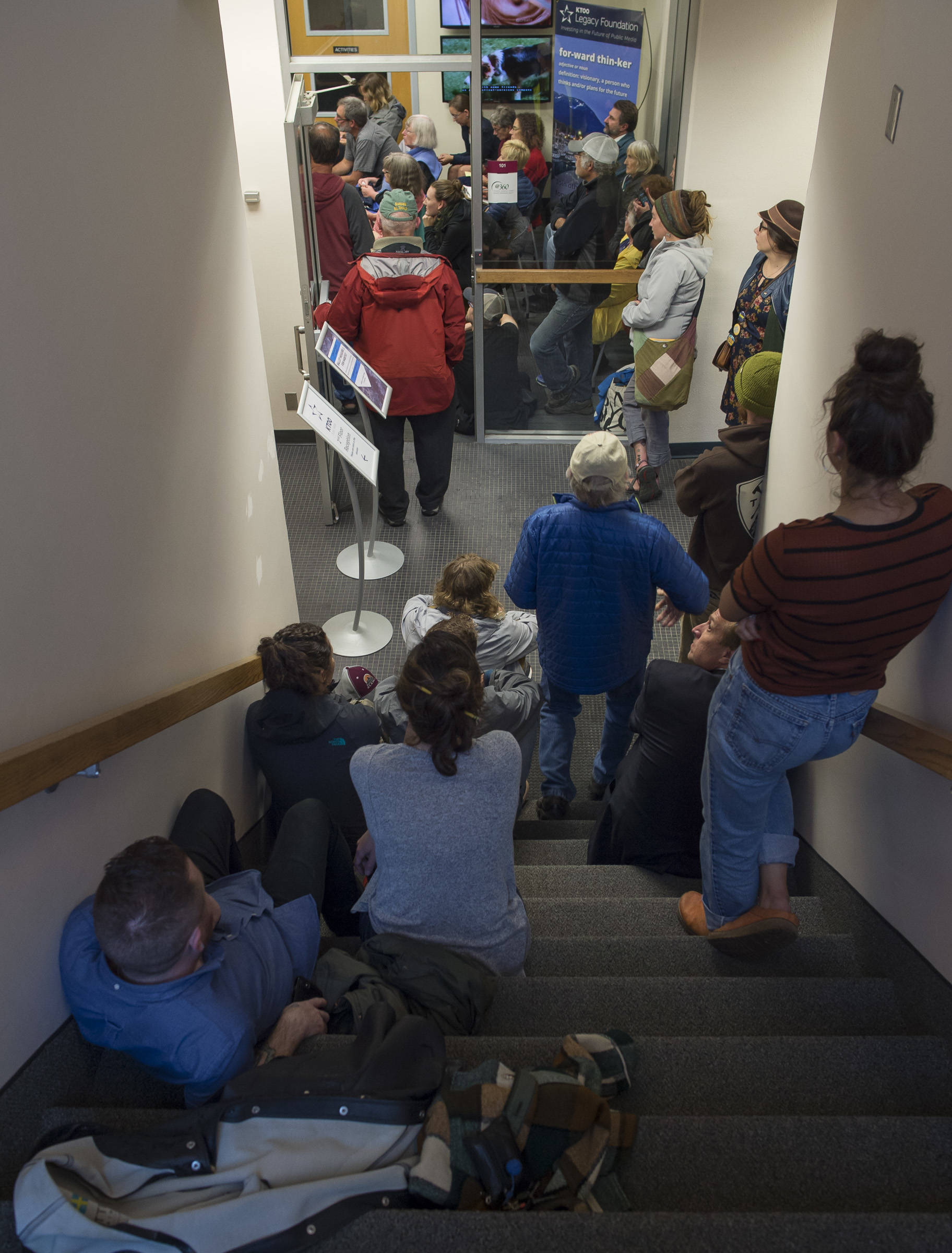The question in November is about Ballot Measure 1, but the question in the room was something different: Who’s more Alaskan?
In front of a crowd that overflowed the KTOO-FM @360 studio, then overflowed the overflow room, Mike Satre of Greens Creek Mine and Emily Anderson of the Wild Salmon Center traded perspectives and rhetorical stingers about Alaska’s most contentious ballot measure since the 2014 referendum on oil taxes.
If approved by voters, Ballot Measure 1 would implement a tough new system of laws protecting salmon-bearing waters. It would become much more difficult for construction projects, including mines, roads and pipelines to get state permits needed to disturb those streams, rivers and lakes.
The discussion stayed away from the technical details of the eight-page ballot measure, which will appear on the Nov. 6 general election ballot. Instead, Satre (who has been campaigning against the measure) and Anderson (who has been doing the same for it), attempted to persuade attendees that their side best represented Alaska’s traditional values and will be beneficial for Alaskans in the future.
“This measure was ginned up and funded by Outsiders with no interest in the state,” Satre said after explaining his family’s lengthy history in Alaska.
Anderson countered with her own story and connection to Alaska’s fisheries.
“It’s a little hypocritical to say we should think about where the stream of money should be coming from,” she said, referring to the millions of dollars being spent by oil, gas and mining companies to defeat the measure.
Monday night’s event was recorded for a Friday TV broadcast on 360 North and online at juneauempire.com. It will also be broadcast on the radio at 7 p.m. Monday on KTOO-FM, and will also statewide public radio. It was the first major statewide forum on the topic since the primary election and was hosted by the Juneau Empire, KTOO and the Juneau Economic Development Corporation.
Empire reporter Kevin Gullufsen and CoastAlaska news director Jacob Resneck hosted the event, which allowed members of the audience to ask questions of Anderson and Satre. Back-and-forth discussion between the two was limited to a handful of rebuttal segments.
Mining and petroleum drilling employs more than 12,000 people in Alaska, and the mining sector pays an average monthly wage of more than $14,000 per month, according to figures from the Alaska Department of Labor.
If the ballot measure passes, Satre said some of that economic gain could be endangered.
Drawing on his experience at Greens Creek, he said that some mining projects cannot advance, even when well-designed, without permanently damaging or destroying fish habitat.
Existing projects compensate for that loss by restoring or preserving larger sections of habitat elsewhere in a process called mitigation.
Ballot Measure 1 would forbid this kind of “off-site mitigation” and require projects to perform mitigation at the job site. Satre said that’s impossible for some work.
“We don’t need a state initiative that will effectively stop mining activities because of that poison pill,” he said.
Later, he added, “For us, the No. 1 thing that causes problems is the inability to use off-site mitigation.”
Anderson admitted that some projects will not be possible under the Ballot Measure 1 protections, saying, “I think many existing operations will be able to meet the standards set.”
She said the goal of the measure is to “restore the balance that has been eroded … since the time of statehood,” and Ballot measure 1 creates that balance.
“It’s a false choice to say you have to pick one or the other. You can have both,” she said.
Alaska’s habitat protection rules are based on regulations, not statute, and Satre admitted that existing law is “somewhat vague.”
The arguments over Ballot Measure 1 arrive at an auspicious moment for Alaska’s salmon industry. On Thursday, the Alaska Department of Fish and Game announced that this summer’s commercial catch is 31 percent below preseason forecasts. Only a banner Bristol Bay year prevented an even worse shortfall.
In some places, returns have been apocalyptic enough that Gov. Bill Walker has already declared a disaster.
At the forum, Satre said there is no doubt about climate change, global warming and ocean acidification.
“Our world is changing on a day by day basis, probably faster than any of us thought possible,” he said.
That said, the problem is in the ocean, not in the freshwater habitat ashore, he said, and that is what Ballot Measure 1 addresses.
Attendees at Monday’s forum included those for and against the measure, but none interviewed by the Empire said their minds had been changed by the forum.
• Contact reporter James Brooks at jbrooks@juneauempire.com or 523-2258.

